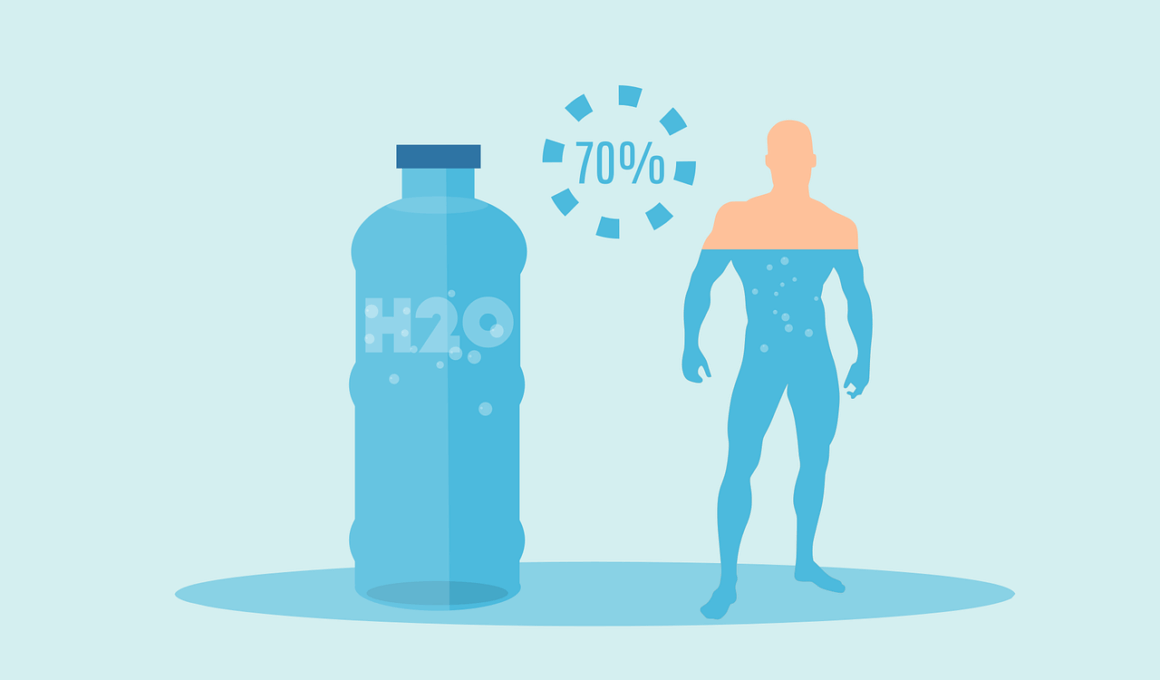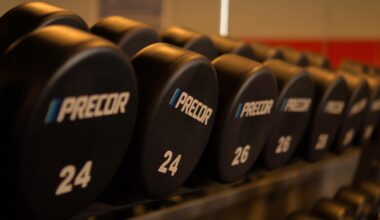Hydration Tips for Athletes Focused on Flexibility Training
Proper hydration is essential for athletes focused on flexibility training, as it maintains muscle elasticity and joint mobility. Dehydration can lead to stiffness, which limits movement and increases the risk of injury. Aim to consume adequate fluids before, during, and after workouts to promote optimal performance. Water is crucial, but consider adding electrolyte-replenishing drinks, particularly during intense exercise sessions. Knowing the signs of dehydration, such as headache, fatigue, or dry mouth, can help you adjust your fluid intake accordingly. Monitoring your urine color can also provide insights into your hydration levels – pale yellow indicates optimal hydration. Establishing a hydration schedule may be particularly beneficial; set reminders to drink water regularly. Additionally, infusing water with fruits or herbs might enhance hydration enjoyment. Also, soak fruits and vegetables in water before consuming to enhance hydration. For those training in hot conditions, adapt your hydration strategy by increasing fluid intake to compensate for greater sweat loss. Overall, aligning hydration with flexibility workouts can enhance your performance and comfort, thus making your training sessions more effective and enjoyable.
Incorporating hydration practices during flexibility training not only aids physical fitness but also contributes to mental clarity. Maintaining hydration levels can help keep your mind focused on movements, improving your technique while stretching. Mental fatigue can hinder your performance and limit your ability to achieve your flexibility goals. Additionally, hydration ensures that muscles remain pliable and ready to stretch, reducing the risk of injury. It helps to understand your individual hydration needs based on factors like body weight, activity intensity, and environmental conditions. A personalized hydration plan ensures that you optimize performance during flexibility-focused workouts. Consider setting a benchmark for water intake according to your activity forecast. Keep a reusable water bottle nearby to encourage frequent sips while warming up or stretching. Another effective approach is to establish hydration practices as part of your routine. Consistently drinking water or fluids will make healthy hydration a habit rather than an afterthought. Experimenting with various beverages, such as coconut water or electrolyte solutions, can create variety. Ultimately, being mindful of hydration in your flexibility training regimen can yield significant benefits for your performance and overall well-being in your fitness journey.
Hydration Before and After Workouts
Athletes should prioritize hydration before and after their flexibility training sessions for optimal performance gains. Ensuring adequate fluid intake pre-workout prepares your body for the physical demands ahead, enhancing circulation and reducing the likelihood of cramps. Starting your training well-hydrated helps maximize joint and muscle mobility, allowing you to access deeper stretches in your workout. Aim to drink about 16 to 20 ounces of water at least two hours before your session. On the other hand, post-workout hydration supports recovery, replenishing fluids lost through sweat. It’s an often-overlooked aspect of training; neglecting rehydration can lead to tiredness and soreness. Drinking at least 16 to 24 ounces of fluids after stretching or flexibility exercises can expedite muscle recovery, reducing overall fatigue. Adding a few electrolytes can further enhance recovery, restoring vital minerals. Always be aware of your individual hydration responses, adapting your fluid intake according to your body’s needs. The key is to build a habit of assessing hydration pre- and post-training regularly to ensure you’re performing at your best. Staying committed to this practice will positively influence your overall training experience, fostering greater flexibility and mobility.
In addition to direct fluid intake, certain foods contribute to your hydration levels, particularly beneficial for athletes focusing on flexibility training. Consuming fruits and vegetables laden with water can aid in electrolytes replenishment and overall hydration status. Choices such as cucumbers, watermelon, oranges, and spinach are excellent options, providing both hydration and vital nutrients. Pack these hydrating snacks for easy access during training breaks. Supplementing your diet with these foods not only aids in hydration but supports overall performance and recovery. Combining nutrient-rich meals with strategic hydration practices ensures that you are providing your body with the necessary building blocks for success. Consuming a balanced meal containing healthy fats, lean proteins, and carbohydrates alongside hydration will enhance adaptability to training stress. Maintaining a diverse intake of hydrating foods can stave off boredom and make hydration enjoyable. To encourage better hydration habits, set a goal to include at least one water-rich fruit or vegetable in each meal. With consistent effort, these small changes can have substantial effects on your performance and flexibility. Hydration, when emphasized through food and drink, can ultimately drive your flexibility training forward.
The Importance of Temperature in Hydration
Another factor that impacts your hydration strategy, especially for flexibility training, is the temperature of the fluids you consume. Drinking water or beverages that are chilled can offer a refreshing experience during hot weather, encouraging more frequent consumption. Chill your water bottle before workouts; the pleasant temperature may motivate you to stay hydrated. Furthermore, be aware that hot beverages can also promote hydration during cooler months. However, too chilled drinks during intense sessions might have effects on digestion, potentially leading to discomfort. It’s crucial to strike a balance with beverage temperature to maximize comfort. Warm herbal teas or broths can serve double duty, providing warmth and hydration post-flexibility training. Leveraging hot and cold beverages throughout your training routine can create variability that keeps your hydration regimen engaging. Experimenting with different temperatures during workouts helps you discover what works best for you. Ultimately, remember that hydration is not solely about fluid quantity but also about how enjoyable and achievable your hydration practices are. Finding a comfortable beverage temperature may directly influence hydration efficiency throughout your training regimen.
Incorporating hydration breaks into your training regimen can effectively enhance your flexibility sessions. Taking short breaks every 15 to 30 minutes to hydrate may help manage fatigue and ensure you’re staying alert and focused throughout your routine. These intervals can also provide moments to assess your stretching technique, ensuring you achieve the necessary form for flexibility goals. During these breaks, utilize cueing techniques to remind yourself of the importance of hydration. Utilize appropriate guidelines to sustain adequate fluid levels, allowing for a planned approach in your training sessions. Besides, you could integrate hydration into your cooldown routine seamlessly, enhancing recovery and maintaining muscle suppleness post-exercise. Consider setting specific goals for your hydration breaks that align with hydration education, creating a plan for intake. Keeping a hydration journal can help track your fluid intake alongside stretching sessions, establishing accountability. With consistency, this practice allows you to develop a better feel for your body’s needs. Ultimately, integrating regular hydration breaks should elevate your overall mobility and flexibility. The outcome will include improved workout quality and reduced fatigue, fostering a safe training environment conducive to growth.
Staying Hydrated Throughout the Day
Lastly, maintaining hydration throughout the entire day is crucial for athletes concentrating on flexibility training. Optimize daily hydration habits by establishing a routine that promotes consistent fluid intake. Keep a designated water bottle in clear view on your desk, encouraging you to take sips frequently. Set calendar reminders to help monitor your hydration levels, ensuring that you drink water regularly. In addition, pairing water consumption with daily activities fosters better habits – for instance, drinking a glass of water before every meal. Furthermore, consider utilizing hydration apps that send notifications to remind you to stay hydrated. Staying consistent with liberal fluid intake can significantly help in achieving flexibility goals. Adopting a cultural approach to hydration based on your environment can reinforce the importance of this practice. Correct hydration also supports cognitive function; improving concentration and focus during training. Observe the impact of hydration on your energy levels, adjusting your routine as necessary. Ultimately, by being proactive with hydration outside of flexibility training sessions, you create an overall lifestyle that supports your athletic ambitions.
In conclusion, hydration is an integral part of flexibility training for athletes who strive to improve their performance and well-being. Understanding the significance of fluid intake and establishing effective hydration practices can enhance muscle elasticity and joint flexibility. By approaching hydration holistically—combining water consumption, hydrating foods, temperature considerations, and regular breaks—you create an enriching training environment. This tailored strategy not only ensures that you remain well-hydrated but also amplifies the benefits of your flexibility-focused exercises. Through consistent application of these hydration tips, you can unlock greater potential in your training. Take the time to monitor your hydration, adapt as needed, and enjoy the process of improvement. Consider booking sessions with a nutritionist or a hydration specialist to further tailor your program. Effective hydration practices support enhanced flexibility, reduced stiffness, and an overall improved quality of life. Bottom line: commit to hydration as part of your training routine, and you will notice the positive impact on your physical performance and health alike. This commitment to hydration provides far-reaching benefits, reinforcing your flexibility and mobility aspirations.


